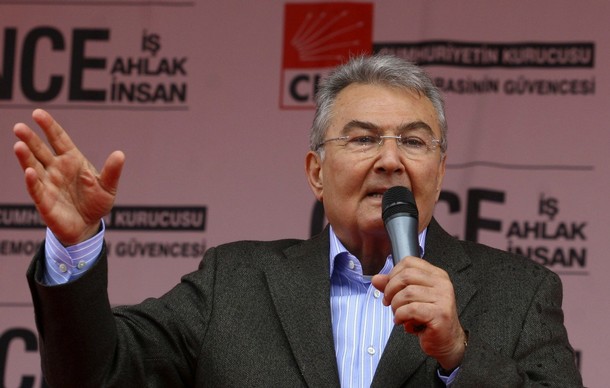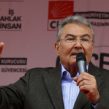
Turkish Military Coup Debate Resurfaces
Publication: Eurasia Daily Monitor Volume: 6 Issue: 123
By:

While Ankara was preoccupied with determining the authenticity of the recent document indicating that the Turkish Armed Forces (TSK) might attempt to topple the government, the chairman of the opposition Republican People’s Party (CHP), Deniz Baykal, suggested changing provisional article 15 in the constitution in order to lift the ban on prosecuting the leaders of the 1980 military coup. Baykal said that if Prime Minister Recep Tayyip Erdogan wants to bring the military coup attempt to court, then he must begin with the events in 1980. If the government is sincere about its claim to counter any attempted military coup, then the CHP is ready to support changes to the constitution that allows coup leaders to be brought to justice (Anadolu Ajansi, June 23).
The provisional article 15 reads:
"No allegation of criminal, financial or legal responsibility shall be made, nor shall an application be filed with a court for this purpose in respect of any decisions or measures whatsoever taken by: the Council of National Security formed under Act No. 2356 which will have exercised legislative and executive power on behalf of the Turkish nation from September 12, 1980 to the date of the formation of the Bureau of the Turkish Grand National Assembly, which is to convene following the first general election; the governments formed during the term of office of the Council, or the Consultative Assembly which has exercised its functions under Act No. 2485 on the Constituent Assembly. The provisions of the above paragraphs shall also apply in respect of persons who have taken decisions and adopted or implemented measures as part of the implementation of such decisions and measures by the administration or by the competent organs, authorities and official" (Turkish Constitution, Provisional Article 15).
Prime Minister Erdogan in response to Baykal stated that his party would not take steps based on "bad jokes," implying that Baykal is not sincere and there is no real preparation on the part of the CHP to annul provisional article 15 (ANKA News Agency, June 25).
The debate between the Justice and Development Party (AKP) and CHP suddenly ignited the political climate in Ankara. Baykal, in order to show that he is sincere about his suggestion, sent his deputies to the AKP to discuss the details on how to annul the article. The head of the CHP group in parliament, Hakki Suha Okay, met with his counterparts in the AKP. After the meeting he said that parliament should do its job, and allow the state prosecutors to investigate the military coup (Anadolu Ajansi, June 25). On the other hand, the head of the constitution commission AKP deputy Burhan Kuzu suggested that the constitution must be changed, since it was a product of the coup in 1980. However, the CHP, instead of annulling all undemocratic articles in the constitution simply wants to change provisional article 15 (NTV, June 25).
Various segments of society rapidly participated in the debate, especially the leaders of leftist groups who suffered during the 1980 coup period. They declared in numerous statements their support for the CHP’s proposal. The Human Rights Association, Social Democracy Foundation, 78’s Initiative, Liberty and Solidarity Party (ODP) were among the few NGO’s that supported the proposal (www.bianet.org, June 24).
The leader of the 1980 military coup, the seventh President of Turkey, Kenan Evren responded furiously. Evren stated, "I suggest a referendum on whether the majority of people want me to be judged. If so, I will not wait for the verdict -I would commit suicide" (Hurriyet June 26).
Turkish society is sharply divided into two camps over whether the controversial article should be annulled. The mainstream media has reminded people of the situation that dragged the country into a military coup in the late 1970’s (Hurriyet, June 25). The pro-AKP media tend to question Baykal’s motives, alleging that he is only seeking personal political advantage. Indeed, owing to the time limit over crimes committed during the 1980 military coup, bringing these individuals to justice might prove impossible (Star, June 26).
In strictly legal terms it would be difficult to bring the coup leaders to justice. However, it is a moral obligation for a democratically elected parliament to annul an article in the constitution that prohibits any investigation into wrongdoings during the 1980 coup. The National Action Party deputy Cihan Pacaci agreed that it would be ambitious to prosecute the 1980 coup leaders after 30 years. However, annulling provisional article 15 would show that military coups are wrong and that interrupting democracy is unacceptable. Parliament might also pass a law to exonerate the victims of 1980 coup (NTV, June 24).
As Turkey pursues additional democratic reforms, people in different segments of the society are questioning the country’s problematic history. Consequently, the CHP leader’s proposal to bring the organizers of the 1980 coup to justice was widely welcomed within Turkish society. It remains to be seen whether such steps will prevent military officers from preparing plans to weaken the elected government. Nonetheless, it would be a symbolic gesture for Turkish democracy to implement such measures.




